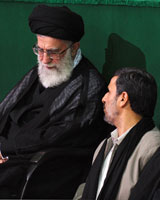 Last night, on the Iran LiveBlog, I noted the steady pull-out of European ambassadors and closure of embassies in Tehran, with the European Union considering further sanctions on Iran today, and wrote: "At this rate, the attack on the British Embassy --- assuming that the regime was not looking to use it for a showdown with Europe as well as the US and Britain --- is looking like a serious mis-calculation."
Last night, on the Iran LiveBlog, I noted the steady pull-out of European ambassadors and closure of embassies in Tehran, with the European Union considering further sanctions on Iran today, and wrote: "At this rate, the attack on the British Embassy --- assuming that the regime was not looking to use it for a showdown with Europe as well as the US and Britain --- is looking like a serious mis-calculation."
The immediate mis-calculation, following Tuesday's not-very-spontaneous "spontaneous" attack on the British Embassy in Tehran, was of the response by the UK Government. Foreign Minister William Hague's statement to the House of Commons was a full-frontal defiance: "immediate closure" of the Iranian Embassy and departure of all staff from Britain within 48 hours.
To be fair to the regime, I joined it and a lot of analysts in predicting a cautious British reply, well short of Hague's declaration. But I don't pay the price for that judgement. Tehran does. There will be a marked effect on intelligence operations, for example, the monitoring of Iranians in the UK. The Embassy also ran high-profile cultural events, gathered information on economic matters, and supervised activities like a student association in London. Iran's Foreign Ministry immediately recognised the situation: soon after Hague's statement, it put out the statement that the British Government was "responsible for all diplomatic assets in London" --- there was no way the Embassy could ensure a satisfactory suspension of activity within two days.
(One related matter to watch ---- the British have already told people, following their shut-down in of their consulate in Tehran, to take matters on affairs like visas to UK posts in Turkey or Dubai. Has Iran made similar arrangements to cover the halt to their consulate's business in the Kensington section of London?)
But, if this scenario is true, how did the regime miss this possibility when it sanctioned Tuesday's demonstration and occupation? That leads to more questions, rather than answers.
To say the least, the approach by Iranian authorities on Tuesday was hap-hazard. If the regime had not approved an invasion of the British invasion, it certainly opened the door for one. There was a limited police presence as the protest gathered, with fewer barriers than usual. While "students" and others --- high-profile MP Hamid Rasaei comes to mind --- whipped up the crowd, the security forces were still low-key. Only much later in the afternoon, after occupiers refused to leave the Embassy compound, would Iran Deputy Police Chief Ahmad Reza Radan show up to try and halt a show of force that was going far beyond any agreed plan.
More than 36 hours later, signs still point to confusion and fragmentation among Iranian officials. While the Foreign Ministry has been reduced to public hand-wringing, there has been silence from the President's office and only one statement from the Supreme Leader's organisation, with his liasion for universities supporting the protesters. The Minister of Interior, shuffling about, has said that it will conduct an enquiry into events. There are signs that the Revolutionary Guards may have tried to calibrate Tuesday's operation --- Fars, reportedly linked to the Guards, was initially advertising the protest and move into the Embassy, but once it went too far with the occupiers briefly holding Embassy employees and declaring their intent to stay, the website was quick to announce police intervention and arrests --- but if so, it failed to do so effectively.
In contrast, Iran's MPs have been quite loud, but they are not singing in tune. Speaker of Parliament Ali Larijani --- as well as his brother Sadegh Larijani, the head of judiciary --- have been posturing. Ali Larijani has salted his denunciation of the US and Britain with a call for calm and order; Sadegh Larijani did not even do that. However, key MP Ahmad Tavakoli --- not only an ally of the Larijanis but their brother-in-law --- let it be known through his media outlet that the raid was ill-considered, illegal, and counter-productive. Alaeddin Boroujerdi, the head of Parliament's National Security Council, has moved between assurances to other Embassies that they would not be attacked while supporting the occupiers.
Even though we still do not have the answer to who gave the green light to Tuesday's plan, this appears to be a confused regime, trying to sort out its next steps after the unexpected turn in developments. Indeed, the lack of an answer to our questions, "Who is responsible? Who is co-ordinating?", is telling. A fragmented political system, beset by in-fighting for months, appears to have embarked on a risky venture which has quickly run into trouble.
And there will be no let-up. Whatever the wisdom or folly of Washington's approach, it has pursued a determined line in the last month --- cast public blame on Tehran and step up sanctions, all in co-ordination with European partners, Canada, and other countries. Today the European Union will consider the widest sanctions in its history upon Iran, including a cut-off of oil imports --- Britain has declared, in the light of Tuesday's events, that it will be calling for those measures, and France and Italy are signalling that they are on-board.
William Hague, underestimated by the regime, not only surprised it by shutting down its presence in Britain. He said, "Your move."
But can the regime settle itself to get that move in order, doing so with shrewder judgement and more co-ordination that it showed earlier this week?